Thoughts on the US Presidential Primary System
The system isn't very good.
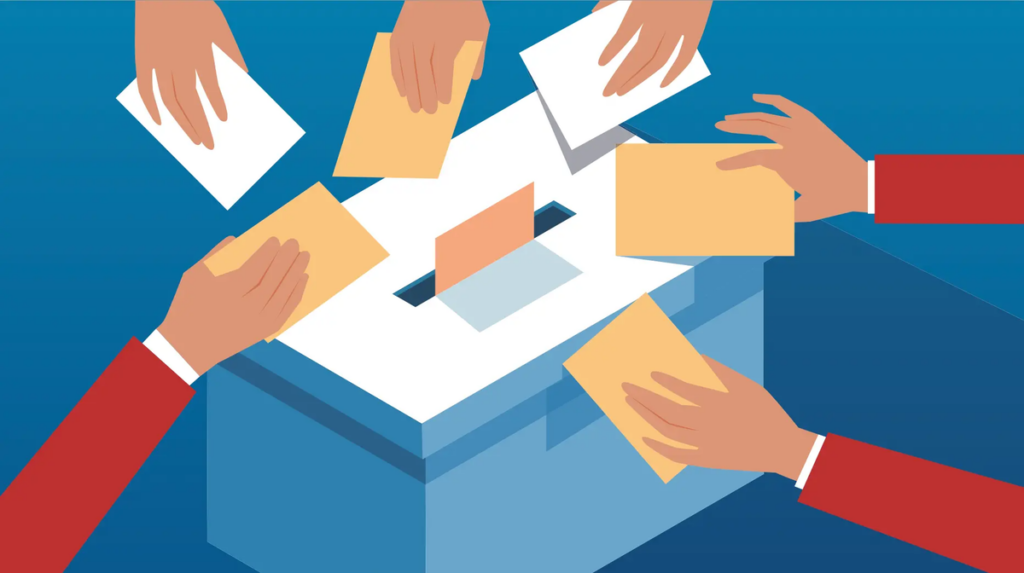
The NYT (2024 Republican Presidential Primary Calendar) provides the following graph of when delegates are selected in the pending 2024 Republican Primary process. Note that fairly early in the process, half the delegates will have been selected. Indeed, Ballotpedia tells us that by the end of Super Tuesday, 42.28% of the delegates will be allocated, a week later 48%, and two weeks later 62.17%. As such, it would take a truly bizarre set of outcomes for the 14 remaining post-March 19th contests to matter one whit.
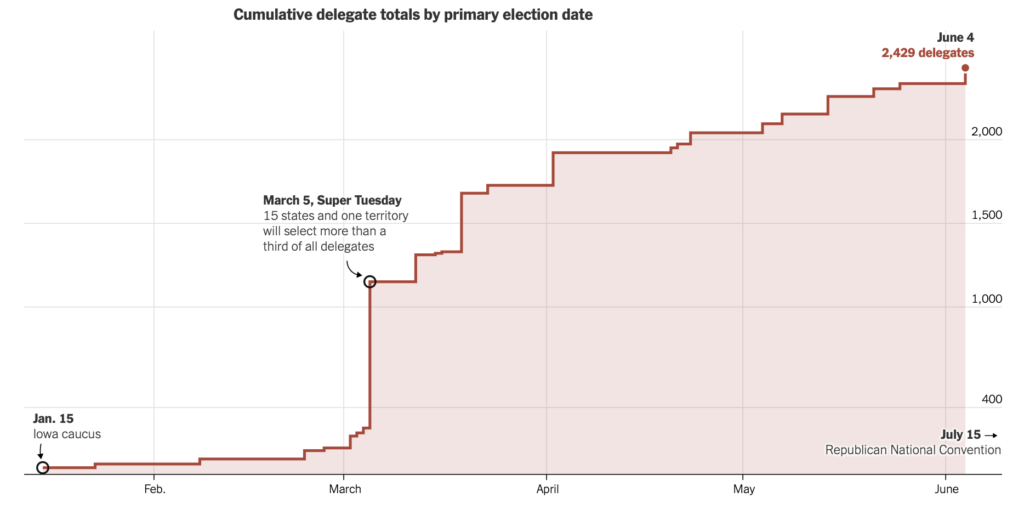
Now, this structural fact is making news of late, because the following has been frequently noted:
This means most voters will go to the polls not knowing the outcome of a federal trial that charges former President Donald J. Trump with conspiring to overthrow the results of the 2020 election. The trial of Mr. Trump, the front-runner for the Republican nomination, is scheduled to start March 4, one day before Super Tuesday, the largest single day of the primary season.
Or, more significantly, voters won’t know of trial-related revelations, as goodness knows when a verdict will be rendered. And while I do think that this is a noteworthy observation, I don’t think will matter all that much, as quite clearly the majority of the GOP selectorate is all-in on Trump (just shy of 60% according to FiveThirtyEight), and it seems rather unlikely that that will change. I still think the only way there is a disruption to the GOP nomination process would be health-related (the same is true of the Democratic process).
Side note, I do think that the trial(s) will affect the general election, but that is a very different animal from the primary process.
At any rate, I come here not to fret about the relationship between the primary calendar and Trump’s legal woes. Nay, I come to simply point out that the calendar is, well, kind of stupid (to use the technical, political science term).
We pretend like this is a national contest and that each state matters, but this is clearly not true. Even going into the concentration of March primaries, it isn’t like there is usually a strong competition, even in years without an incumbent/former president running. The primary process is heavily focused on early success in very small states and is as much a perceptual/press process as it is an electoral one.
Indeed, winning early small states with paltry delegate counts can matter far more to the contour of the race than the math at the time would dictate. And while it is true that some state allocate their delegates proportionally (or, really, semi-proportionally), the devil is in the details. First, relatively small numbers of delegates are harder, mathematically, to divvy up proportionally, insofar as that tends to favor the candidate with the most votes. Further, if the slicing and dicing of a state is down to the district level, it becomes even harder to allocate delegates proportionally in any significant sense. In short, the smaller the number being divided, the more plurality winners benefit, even with proportional rules. Also, the thresholds are pretty high even in a “proportional” state (by rule they can be as high as 20%) meaning that small-vote getters, even with consistent winnings, get bupkis from the given contest.
So, really, I would suggest every read “proportional” in press accounts as “semi-proportional” at best.
The bottom line is that after Super Tuesday, it is basically over and the remaining contests are almost a waste of time and money, save for maybe largely procedural needs. May and June contests have never mattered, and never will. Even April tends to be pointless.
In many this echoes some of my problems with the Electoral College, insofar as both purport to be national contests that take the citizens of all the states into account by forcing candidates to take all the states seriously. However, this is not the case. For the nomination, the calendar dictates importance and in the EC, competitiveness drives it. There is zero incentive in either process to actually take the voters across the country with equal seriousness. Zero.
Further, if the argument is that we need a democratized candidate selection process, then the electoral calendar needs to be compressed. Quite frankly, if that is the goal, then one national primary day, or some sequence of closely clustered primary days, makes more sense.*
For what it is worth, my position has nothing really to do with the contours of the 2024 race. If you time-traveled back and asked me to assess the calendar decades ago, I would have had similar thoughts although depending on how far back you went, you could have found a much younger version of me who would have been far less critical of primaries as a general matter, and would even have extolled them as democratic as some point in my past. But, you know, thinking long and hard and looking at evidence can change minds. Still, I don’t think I have ever thought that the calendar made a damned bit of sense. Somewhere in the archives of my life is a column, I think in the Mobile Press-Register, arguing to move the date of the state’s presidential primary up from June to March, because in June, the state didn’t matter at all.
Often people ask what alternative I would prefer. To be honest, I would rather the parties shift to an entirely convention-based system that did not even utilize the primaries as “beauty contests” the way they did prior to the 1972 reform to the process. I am open to other options, but I am increasingly of the view that forcing parties to collectively assess what they stand for and what they have to do to select the most electable candidate would be far healthier for our democracy than the “democratized” candidate selection process we currently have.**
At a bare minimum, based on the conditions of the race right now, conventions next year would select Biden and Trump, and far more cheaply at that. Further, a convention in the summer would also certainly be more able to adapt to changing conditions (e.g., health or criminal justice related) than the primary system can.
Using conventions as described might have avoided Trump in the first place, and they would also allow the Democratic Party an actual mechanism to replace an aging Joe Biden if, in fact, there was real cause to do so (my money would still be on re-nomination under such a scenario, based on current information, by the way, even at his advanced age).
I also think that if we had a pure convention-based selection process it would cultivate real third-party candidates because any power-seeker who wanted to run would have to break off and form their own party (or run as an independent) because they would no longer be able to use the primary process as a gateway to the general election ballot.
I would note, too, that often one side doesn’t even have a contested primary process because an incumbent is running for re-election. This raises questions of expense and purpose of even holding primaries in those years for that party (which is why you end up with things like the Florida Democrats canceling theirs).
*FWIW, I do not think that the “retail politics” of small, early primary states tells us much of anything useful about candidates, so do not fear losing that in the least. Indeed, I would far, far, far value candidates forced to address national issues instead of kowtowing to corn subsidies in Iowa or whatever other hyper-local silliness the candidates are forced to pretend to care about as a function of the happenstance path dependency of decades-old primary/caucus calendars.
**Ironically, sometimes less democracy means a higher quality democracy. Another example of this would be our long ballots in the US. It is, on the one hand, in the abstract more democratic to have more offices elected, but the reality is that if the voters really don’t understand what they are voting for (or don’t turn out because there are too many elections) then the actual result is not a quality one.


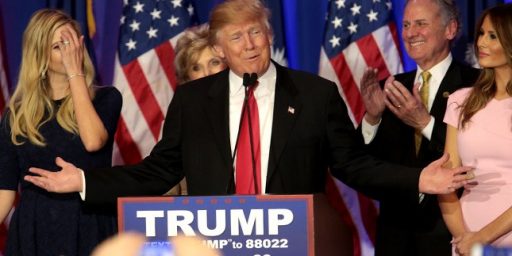
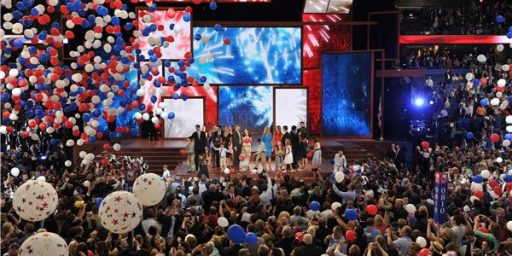
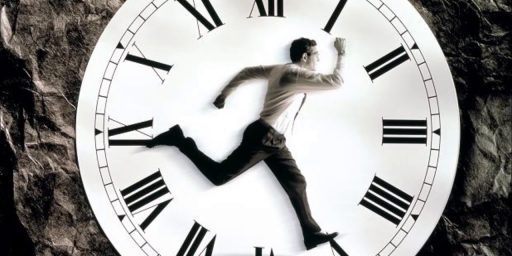
The primary system may once have fulfilled an important role for political parties – after all, if you want to be president, you should be able to assemble a national team of organizers who are door-knocking, phone-banking and handing out your literature at local public events, and then finally getting out your vote on important days. But in the past couple of decades we’ve seen electronic media take over a lot of those functions and what matters more is having a strong media presence. Would Trump have won the nomination in 2016 if he’d had to assemble a national organization like candidates did before the 1980’s? Somehow I doubt it.
@Not the IT Dept.: See, I think that’s all mythology, but it is mythology that has been roundly accepted in the US political psyche.
That is: even “back in the day” I am not convinced that presidential primaries served that function and, moreover, I question as to whether those are the skills we need in a POTUS.
@Not the IT Dept.:
True, but it has also made the parties even more meaningless that the structure of the system makes them. The post McGovern Commission primary system did eliminate the backroom dealing and to an extent limited the influence or special interests, or more accurately promoted the interests of other special interests as groups learned to game the system.
It has never made sense to me that helping parties choose their nominee by running primaries is somehow a governmental function. If a party wants to poll voters as part or, or the entirety of, their candidate selection process that’s fine, but they should have to do so in their own, like when my utility company asks me to vote for board members
I currently live in Iowa. We have way too much sway in a very narrow way. When I learned that the caucuses were moved back I breathed a sigh of relief.
I didn’t realize at the time that it was only the D caucuses that got moved back in the schedule. A bad assumption. I heard what I wanted to hear and moved on immediately.
Nope. I was wrong. The R caucus is still “first in the nation”. I get endless political ads. Both on TV and internet. I get about five texts a day from Haley, DeSantis, and Ramaswany split between. (I got a spam text as I wrote this.)
It’s really annoying because I would never even think about going to caucus for any of you ever in my life. Non-negotiable flat no.
I get barraged by ads incessently because I live in Iowa. I cannot overstate how fucking annoying that is. TV is nigh unwatchable. You need to know the mute button placement as muscle memory. I am inundated with ads for folks I will never, would never vote for.
I am awash in political ad money. I swim in it daily. Local TV stations are loving it.
The way to properly understand the Iowa and New Hampshire vote is to see who lost, not who won. In 2020 Buttigieg won the Iowa caucus handily, Sanders second, and Warren third. In my precinct Buttigieg won big on the first ballot and I was home by 8:30 which is shockingly early. I went in basically split between him and Warren. I knew I would walk away before voting for Sanders or Yang. I was totally fine with Biden or Klobuchar.
We suck at picking the front-runner early and I am weirdly proud about that. Good for us! We leave it up to you all to figure that out.
What IA and NH should do and be perceived as doing is culling the weak and definitely not anointing a front runner. But the system wants a winner, not to talk about losers. Endless, unfounded speculation! Unless you vote in the above states or in South Carolina or Nevada or in a Super Tuesday state your vote basically doesn’t count. The die has already been cast. You’re gilding the lily. Other aphorisms and cliches apply.
It boils down to your vote doesn’t matter. If your state doesn’t select before Super Tuesday or on, you’re basically a spectator. You get basically no say on the party nominee. Fuck you! The system both political and media demands a frontrunner. No, a locked in candidate so we can have a 1 vs 1 dichotomy and endless horse race bullshit.
I don’t get it. A true and hard fought battle up to and into the conventions would be epic! Think of the social platform engagements. But no, everybody seemingly wants a 1 vs 1 as soon as possible. Boo! Boring.
The system wants a clear, uncontested nominee as soon as possible in the schedule. It benefits the party.
The media get out of multifactoral analyses and into the WWE style cage match viewers crave.
And voting power of rural people has more input into the outcome than do city folk. In some states it is substantially more. Political parties gerrymander because 1. They can, 2. It works.
It is shockingly easy to disregard several hundred thousand votes just by clever design of congressional districts. And if your party has the trifecta in that state who’s gonna stop you? The courts? LOL
It’s speculation, but modern politics after Vietnam deals with television, the silent majority, and how candidates reach across the distance to be authentic to this mass. And the primary system is a good way to vet candidates for this. It’s an entire proving ground of realness and authenticity.
I’m thinking about that famous Didion story about watching Michael Dukakis playing catch on an airport tarmac and the press gushing about how real and regular he looked…for whatever reason, this became the status quo for American politics, the way that messages have been sent and received about parties and policies.
That the senders and receivers are the same people–the media and the political class–and that no distance is ever closed by fake authenticity is the point. Elites behind closed doors can’t tell you what to do. But they can put a baseball mitt on a guy and then other elites can debate whether if this guy is a guy the common man would drink beer this and then other elites would poll this image, etcetera. And the primaries are ways of feigning authentic politics in the same way that playing catch is a way of feigning living paycheck-t0-paycheck.
@Erik:
Technically primaries are NOT a government function. They are a party function (this actually came into play with the recent question of the 14th Amendment and Trump’s candidacy in a number of court cases). So they are overseen by each party rather than local governments.
That said I am unsure of who actually pays for the primary elections.
@Erik:
Technically primaries are NOT a government function. They are a party function (this actually came into play with the recent question of the 14th Amendment and Trump’s candidacy in a number of court cases). So they are overseen by each party rather than local governments.
That said I am unsure of who actually pays for the primary elections.
Slightly off topic, but
This doesn’t matter. The fact that he has been charged, his behavior that can be seen on television, show that he lacks the qualities required for being president. The legal standard doesn’t apply.
Sadly, far too many people will vote for him anyway.
@mattbernius: interesting. They certainly appear to be a government function here. The ballots look the same as the general, the Sec of State produces a voter guide that looks the same, we put our ballots in the same drop boxes, etc. I’m not saying you are wrong, just that there doesn’t seem to be an easy way to detect that distinction, at least here. Furthermore, since we have top two primary system it seems impossible that the government wouldn’t be as involved in the primary as the general since otherwise how could they determine who went on the general ballot?
@Modulo Myself:
I would suggest that this is the mythology of the primary process, but I would counter that there have been enough examples of front-runners going into the process who then won the nomination to counter that notion. I do not see a great number of examples of the crucible of the primaries producing the best candidate to convince me that the mythology is real.
@Steven L. Taylor:
I think both Bill Clinton and Obama would be examples of the primary system producing successful candidates who may not have been chosen in the conventions. Clinton especially benefitted from a system that seemed designed to pull away from technocrats and old-time Democrats like Mario Cuomo. And he used the primaries to prove that a guy who had a bunch of affairs and admitted ‘causing pain’ could still get votes.
@mattbernius: So the government function – election certification? inauguration? is that where we fight the 14th Amendment battle then?
@Tony W:
The ruling is, as I understand it, a Party is allowed to nominate someone who isn’t able to assume the office.
As to when the 14th would execute–that I am unsure of. There is again the question of how it would execute. Not sure about that. This was a decision at the Federal District Court, so it would still be possible to appeal.
@mattbernius: My favorite part of that ruling was that the judge basically said “sure, he’s an insurrectionist, but this isn’t the time/place we decide if he’s eligible”, knowing full well the ruling would be reviewed by a higher court anyway.
Similar to the E. Jean Carroll case where the judge declared him a person who committed sexual assault and ordered restitution. So he wasn’t convicted of rape, but a judge essentially found him guilty.
Trump is very good at winning without winning.
Can we pause for a moment to observe how absurd this discussion is? That the liberal MSM is still positioning this felonious idiot as a Very Serious Candidate for president?
@Modulo Myself:
Don’t get me wrong, I am not saying that primaries have been inconsequential. I think Obama is an especially good example, as a pure convention would have almost certainly have picked HRC in 2008. Bill Clinton benefitted as much from the fact that people like Cuomo didn’t run in 1992 because all the Dem partry stalwart thought Bush 41 was unbeatable when decisions were being made.
What I was specifically addressing was that I do not accept the assertion that the primary process itself is a good mechanism for vetting candidates. I think that is the story we have been told, often basing it on things like Carter in Iowa in 1976 and letting the mythos grow from there.
Note that campaigning would still exist under an alternative format, but it just wouldn’t drive candidates to be so myopic about IA, NH, and the like.
I suspect the model of “several primaries during months” could have the advantage of working as a kind of “Instant Runnof Voting” in a way more easy to process by the brain of normal people. The system where, after each state primary, some minor candidate quits, until there is only one in the end, is perhaps the best way to have an high probability that the chosen is the “Condorcet winner” among the supporters of that party